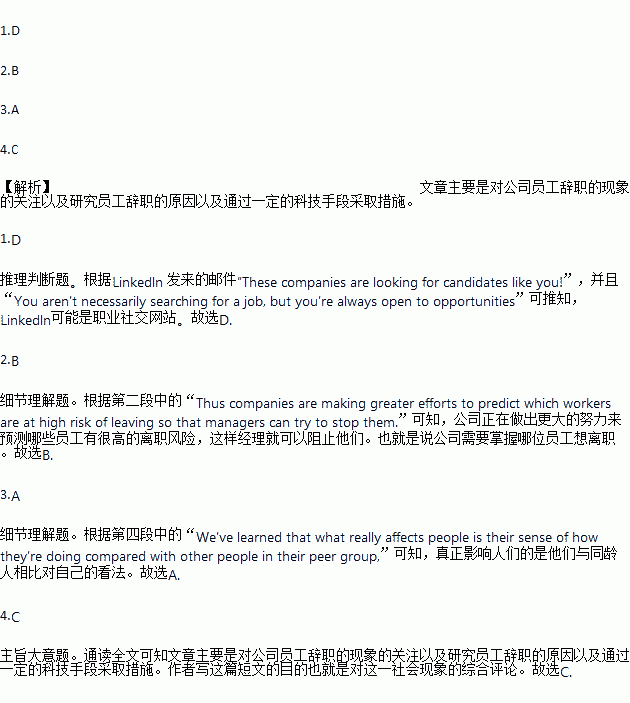题目内容
Imagine that you’re looking at your company-issued smartphone and you notice an e-mail from Linkedln: “These companies are looking for candidates like you!” You aren’t necessarily searching for a job, but you’re always open to opportunities, so out of curiosity, you click on the link. A few minutes later your boss appears at your desk. “We’ve noticed that you’re spending more time on Linkedln lately, so I wanted to talk with you about your career and whether you’re happy here,” she says. Uh-oh.
It’s an awkward scene. Attrition (损耗) has always been expensive for companies, but in many industries the cost of losing good workers is rising, owing to tight labor markets. Thus companies are making greater efforts to predict which workers are at high risk of leaving so that managers can try to stop them. Methods range from electronic monitor to well-designed analyses of employees’ social media lives.
Some of this work may be a reason to let employees to quit. In general, people leave their jobs because they don’t like their boss, don’t see opportunities for promotion or growth, or are offered a higher pay; these reasons have held steady for years.
New research conducted by CEB, a Washington-based technology company, looks not just at why workers quit but also at  when. “We’ve learned that what really affects people is their sense of how they’re doing compared with other people in their peer group, or with where they thought they would be at a certain point in life, says Brian Kropp, who heads CEB’s HR practice. “We’ve learned to focus on moments that allow people to make these comparisons.”
when. “We’ve learned that what really affects people is their sense of how they’re doing compared with other people in their peer group, or with where they thought they would be at a certain point in life, says Brian Kropp, who heads CEB’s HR practice. “We’ve learned to focus on moments that allow people to make these comparisons.”
Technology also provides clues about which star employees might be eyeing the exit. Companies can tell whether employees using work computers or phones are spending time on (or even just opening e-mails from) career websites, and research shows that more firms are paying attention to these things. Large companies have also begun searching for badge swipes (浏览痕迹)---- employees’ use of an ID to enter and exit the building or the parking garage---to identify patterns that suggest a worker may be interviewing for a job.
1.What can we infer about Linkedln in the text?
A. an e-mail B. a job from the Internet
C. a world-famous company D. a professional social network
2.According to the passage, how can companies prevent workers from quitting?
A. Companies can analyze workers’ social media lives.
B. Companies need to find out workers likely to quit.
C. Companies must try to reduce the cost of losing good workers.
D. Companies should be stricter with workers.
3.According to the research by CEB, which of the following might be the most probable reason for workers to quit their jobs?
A. Workers are always doing comparisons.
B. Not seeing opportunities for promotion.
C. To find a higher-paid job.
D. They don’t like their bosses.
4.What is the author’s purpose in writing the text?
A. To show a new trend in the job market.
B. To stress the role of new technologies.
C. To make a review on a phenomenon.
D. To tell us the leader’s concerns.

